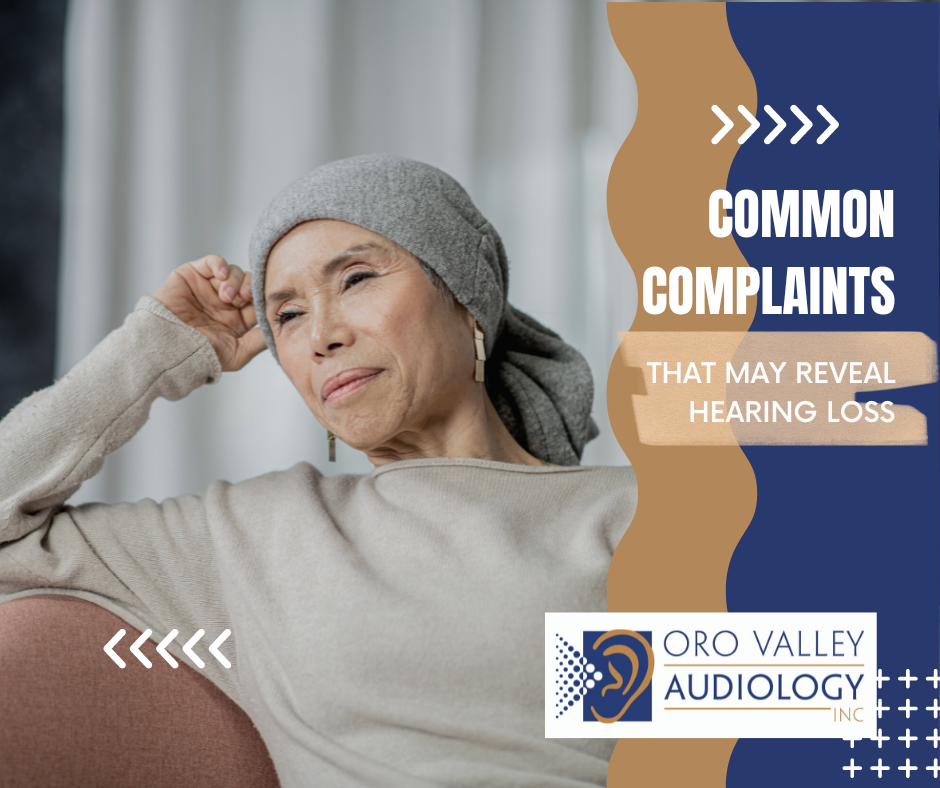Most of our patients don’t understand how slowly hearing loss progresses. We commonly hear from 40-50-year-olds that they are “not old enough” to have treatable hearing loss. However, hearing loss can happen to anyone and it rarely happens all at once over a week or month. In fact, most types of hearing loss progress so slowly over the years that it is undetectable.
If you suspect that you or someone you know may have hearing loss, pay attention to the complaints you or they make. Below are the five most common complaints spoken by people with untreated hearing loss not caused by an injury and what to do about it.
- “I can hear, but I can’t understand you because you’re mumbling!” This complaint is probably the most common one we hear. Most times, the perception of mumbling is caused by high-frequency hearing loss, the most common type of hearing loss. Someone with high-frequency hearing loss will have no difficulty hearing low-frequency vowel sounds, but they will struggle to hear (or entirely miss) high-frequency consonants and blends such as “f,” “h,” and “sh.”
- “I can hear men fine. I just can’t hear women.” Once again, this complaint can indicate untreated high-frequency hearing loss. Women and children’s voices are typically high frequency and will become challenging to hear for someone with this type of hearing loss. Fortunately, hearing aids are designed to amplify only the frequencies you need. Audiologists can program hearing aids to fit your specific type of hearing loss. They can choose to amplify lower or higher frequencies until your hearing is perfected. If your hearing loss changes over time, programmable hearing aids can be adjusted to continue serving their purpose.
- “It’s too loud in this restaurant. I can’t hear anything!” Struggling to hear in background noise could indicate a moderate hearing loss or auditory processing disorder (APD). This is something we definitely counsel patient’s on daily. It can even be a problem for those who wear hearing aids. The reason is that low-frequency background noise covers up those important high-frequency constant sounds!
- “What did you say? Huh? Say that again.” Perhaps the most noticeable and identifiable comment from people with hearing loss is the request for repetition. Many times, they heard what was said—meaning that sound entered their ears and their brains registered it as sound—but their brains didn’t understand what those sounds represented. Hearing testing is critical to discover what type of hearing loss is causing this loss of information.
- “Thanks for the invite, but I’m going to stay home.” People with hearing loss tend to withdraw from social situations, purposely isolating themselves to avoid embarrassing situations caused by their inability to hear properly. Those who are socially isolated, especially with hearing loss, increase their risk of cognitive decline, anxiety, and depression. A study performed by Lin MY, Gutierrez PR, Stone KL, and others found that individuals with hearing loss developed between 30% and 40% acceleration of cognitive decline and 24% increased risk for incident cognitive impairment during a six-year period compared to those with normal hearing. An audiologist can offer suggestions to avoid a loss of brain function and a return to normal, happy, social living.
Have any of these complaints sound familiar or even convicting? Hearing loss isn’t always a sudden change that you immediately notice. Most often, it’s a slow progression that leaves you irritable, exhausted, or depressed. My patients always tell me they wish they wouldn’t have allowed hearing loss to dictate their life for as long as it did. Don’t allow your hearing loss to dictate YOUR socialization habits. Reach out today by scheduling by calling us here at 520-825-4770 to help you identify and treat your specific type of hearing loss quickly and comfortably.
At Oro Valley Audiology, we are committed to helping you stay active and engaged with the world around you! Complaints point to the root of the problem; fortunately, we have a solution.
Sources:
“The Cognitive and Behavioral Consequences of Hearing Loss, Part 1.” Practical Neurology, Bryn Mawr Communications, https://practicalneurology.com/articles/2017-oct/the-cognitive-and-behavioral-consequences-of-hearing-loss-part-1.


